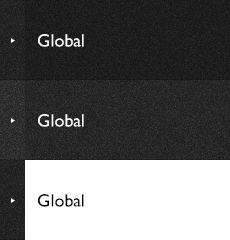
Natt Leelawat
Head, Disaster and Risk Management Information Systems Research Group, Chulalongkorn University
The magnitude 9.0 earthquake and tsunami that struck Japan in March 2011 and the Thailand Floods of the same year were among the most destructive natural disasters in Natt Leelawat's lifetime.
For Leelawat — who began graduate studies at Tokyo Tech as Japan and Thailand reeled from these disasters — the year 2011 would mark a turning point in his life and career.
"What I learned from Tokyo Tech and being in Japan helped me clarify my interests, create new research on disaster risk reduction, and communicate my knowledge to a new generation of engineers and technologists," he says.
In this Alumni Story, Leelawat discusses his path from Tokyo Tech graduate student to lecturer and researcher at the forefront of disaster management in Thailand.
This article is based on content submitted by Leelawat to the Tokyo Tech Bulletin.
The starting point of my disaster management research path
I started work on my master's degree at Tokyo Tech in April 2011, just weeks after Japan's northeast coast was ravaged by the Great East Japan Earthquake and tsunami.
It was difficult for my family in Thailand to get sufficient information about the situation in Japan at that time, and they were really worried about me. Even for me, and especially in those early months, it was sometimes hard to get accurate and understandable information. I relied heavily on information gathered from the Institute and my laboratory and from friends.
While I studied in Tokyo, Thailand was experiencing flooding that turned out to be the worst in half a century, with inundation of more than two-thirds of the country. That October, my house in Bangkok was flooded. I talked with family members by telephone after they evacuated by boat with rescuers from the Royal Thai Army, but I could not do anything from where I was.
I had entered Tokyo Tech with the intention of studying information systems, but my family's experiences that year motivated me to focus specifically on disaster-related research. On the advice of my academic supervisor, I applied for the Risk Solution in Engineering Systems research grant offered through Tokyo Tech's Graduate School of Decision Science and Technology1, and that was the starting point of my disaster management research path.
Learning information systems applications from a pioneer in the field of enterprise engineering
As a student of Professor Junichi Iijima — a pioneer of the enterprise engineering discipline2 in Japan and head of Tokyo Tech’s Information Systems Laboratory — I learned how information systems can be applied in various contexts. I also explored research methodologies and information system tools, and deepened my knowledge of Design and Engineering Methodology for Organizations (DEMO). I also learned a number of research models under the guidance of Professor Iijima, Assistant Professor Jaehyun Park
— a pioneer of the enterprise engineering discipline2 in Japan and head of Tokyo Tech’s Information Systems Laboratory — I learned how information systems can be applied in various contexts. I also explored research methodologies and information system tools, and deepened my knowledge of Design and Engineering Methodology for Organizations (DEMO). I also learned a number of research models under the guidance of Professor Iijima, Assistant Professor Jaehyun Park , then-Assistant Professor L. G. Pee, and then-Assistant Professor Ho Sho.
, then-Assistant Professor L. G. Pee, and then-Assistant Professor Ho Sho.
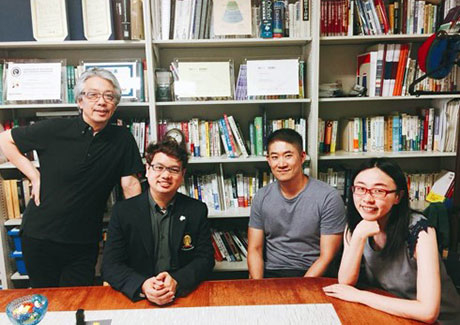
(from left) Professor Iijima, Leelawat,
Assistant Professor Park, and Tokyo Tech alumna Dr. Jing Tang
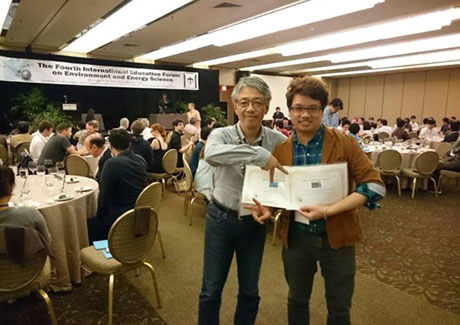
Professor Iijima (left) congratulates Leelawat on awards
won at the 4th International Education Forum
on Environment and Energy Science, Hawaii, USA
Through my participation in the Academy for Co-Creative Education of Environment and Energy Science (ACEEES)3, a Tokyo Tech leadership program for graduate students, and my service as a vice president of the Thai Students’ Association in Japan under the Royal Patronage (TSAJ ), I developed a long-term vision for my work as well as valuable management skills.
), I developed a long-term vision for my work as well as valuable management skills.
Returning to Thailand
Having returned to Thailand in 2017, I am now contributing to disaster management in my home country. Compared with Japan, Thailand seems to have fewer natural disasters. However, Thailand's experience of the 2004 Indian Ocean tsunami and the 2011 floods had a huge impact on the country, both socially and economically.
Together with other Thai experts in disaster management, I am involved in efforts to increase people's awareness of disaster preparation, sharing lessons learned from Japan and other countries, and contributing to efforts to make information more plentiful and easier to access.
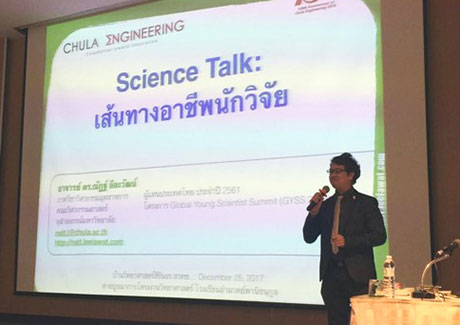
Leelawat describes researcher career paths
to high school students in Thailand
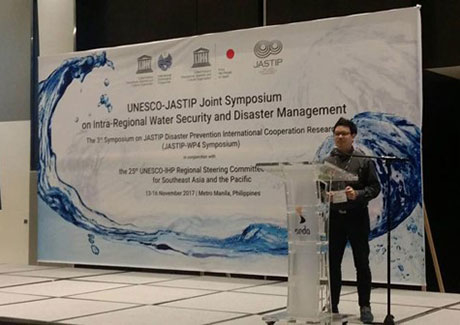
Leelawat speaks at the UNESCO-JASTIP Joint Symposium
on Intra-Regional Water Security and Disaster Management,
the Philippines
In recent years, better practices in disaster risk management have led to better outcomes, as seen in the Tham Luang Cave rescue operation in 2018 and Tropical Storm Pabuk in 2019.
New directions in disaster management and large-scale collaborations
The experiences I gained at Tokyo Tech's Information Systems Laboratory have helped me in my current role as head of the Disaster and Risk Management Information Systems (DRMIS) research group at Chulalongkorn University.
Officially established at the end of 2018, the group comprises experts from industrial engineering, water resource engineering, and civil engineering. By bringing together researchers from these various areas, our group is able to consider the needs of diverse stakeholders and offer an interdisciplinary approach to our projects. Our main goal is to analyze, design, and develop sustainable information systems for both disaster management and risk management.
Research topics I’ve worked on recently include analyzing building damage from hydrological disasters, developing emergency and disaster plans for universities, and developing simulation models for emergency evacuation.
My goal is to find new technology solutions for disaster risk reduction and sustainable development. I’d like to help contribute research outcomes that will benefit society.
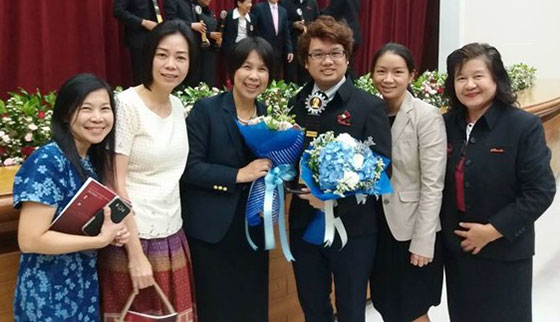
Leelawat with Chulalongkorn University colleagues
after receiving the 2018 SakInthania's
Young Lecturer Award
Our group is currently collaborating in a large-scale project 4 — involving partnerships between Chulalongkorn University, Nagoya Institute of Technology, and other organizations in Japan and Thailand — for which we are developing a model online system for business continuity management in areas such as industrial parks.
4 — involving partnerships between Chulalongkorn University, Nagoya Institute of Technology, and other organizations in Japan and Thailand — for which we are developing a model online system for business continuity management in areas such as industrial parks.
Japan’s case studies and advanced technologies have also been invaluable to the course I teach on disaster management and technology at Chulalongkorn University.
The course, an elective for master’s students at the Faculty of Engineering, covers basic concepts underlying natural disaster mechanisms, the disaster risk management cycle, and technological solutions for disaster risk reduction.
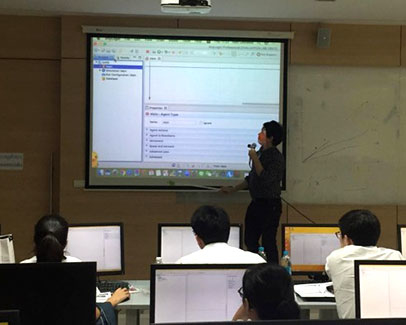
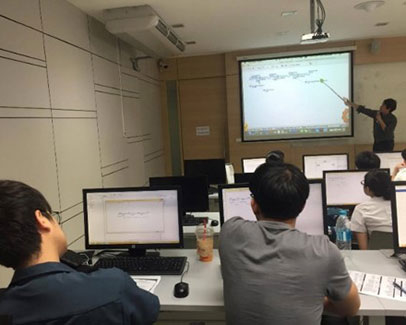
Disaster Management and Technology course, Chulalongkorn University
Staying connected through the Tokyo Tech Alumni Association
As a committee member of the Thai Kuramae Kogyokai, or Tokyo Tech Alumni Association (Thailand Chapter) , I'm happy to say our alumni network here is going strong with more than one hundred active members, who can connect through our online groups, community network, and activities.
, I'm happy to say our alumni network here is going strong with more than one hundred active members, who can connect through our online groups, community network, and activities.
As a member of this community, I can keep up to date on the latest news and technology. Whenever I need information or some help related to tech issues, I can just request it through our active online channel and get feedback right away from other members.
Similarly, as Thai alumni are active in technology and industry through a wide range of organizations, the association enables members to make connections across academia, industry, and government, not only within the country but also between Thailand and Japan.
We are building networks with Thai Tokyo Tech alumni in other countries too.
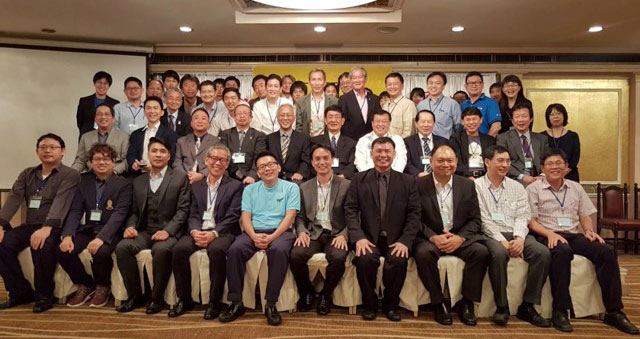
Gathering of Tokyo Tech executives and Thai alumni in Bangkok
Be an active learner and make as many friends as you can
If you join Tokyo Tech, try to make the most of the opportunity. Enjoy the wonderful academic atmosphere, learn as much as you can, and make as many friends as you can.
Tokyo Tech provides students with a truly international environment. I made friends from many countries in the laboratory, in classes, and at various events on campus, and we still keep in touch today. I am proud to be a Tokyo Tech alumnus.
1
Leelawat studied at Tokyo Tech under the education system that was in place prior to the April 2016 education reforms.
2
Defined as the body of knowledge, principles and practices related to the analysis, design, implementation and operation of elements associated with an enterprise.
3
Academy for Co-Creative Education of Environment and Energy Science (ACEEES) was a university-wide interdisciplinary education program to nurture future leaders in innovation in energy and environment fields. It was re-organized as the Association for Collaborative Exploration Exceeding Each Specialty in April 2018.
4
The project, "Regional Resilience Enhancement through Establishment of Area Business Continuity Management at Industry Complexes in Thailand," is supported by SATREPS , a collaboration between Japan Science and Technology Agency (JST) and the Japan International Cooperation Agency (JICA).
, a collaboration between Japan Science and Technology Agency (JST) and the Japan International Cooperation Agency (JICA).
Natt Leelawat
Profile
- 2018 -Head, Disaster and Risk Management Information Systems Research Group, Chulalongkorn University, Thailand
- 2017 -Lecturer, Department of Industrial Engineering, Faculty of Engineering, Chulalongkorn University, Thailand
- 2017 -Lecturer, Risk and Disaster Management Program, Graduate School, Chulalongkorn University, Thailand
- 2016 - 2017Postdoctoral Researcher and Assistant Professor, International Research Institute of Disaster Science (IRIDeS), Tohoku University, Japan
- 2016D.Eng., Industrial Engineering and Management, Tokyo Institute of Technology
- 2013 - 2016Research Assistant, Academy for Co-creative Education of Environment and Energy Science (ACEEES), Tokyo Institute of Technology
- 2013M.Eng., Industrial Engineering and Management, Tokyo Institute of Technology
- 2010 - 2011Research Student, Industrial Engineering and Management, Tokyo Institute of Technology (MEXT Scholarship recipient)
- 2007 - 2009Systems Analyst, Information Technology Department, Bank of Thailand
- 2007B.Sc. (1st Class Honors), Information Technology, Sirindhorn International Institute of Technology, Thammasat University, Thailand
Leelawat is also a columnist for TPA News, a Thai-language publication of the Technology Promotion Association (Thailand-Japan), where he shares information on risk reduction strategies. In 2018, he represented Thailand at the Global Young Scientists Summit (GYSS) in Singapore.
The Special Topics component of the Tokyo Tech Website shines a spotlight on recent developments in research and education, achievements of its community members, and special events and news from the Institute.
Past features can be viewed in the Special Topics Gallery.
. Any information published on this site will be valid in relation to Science Tokyo.












